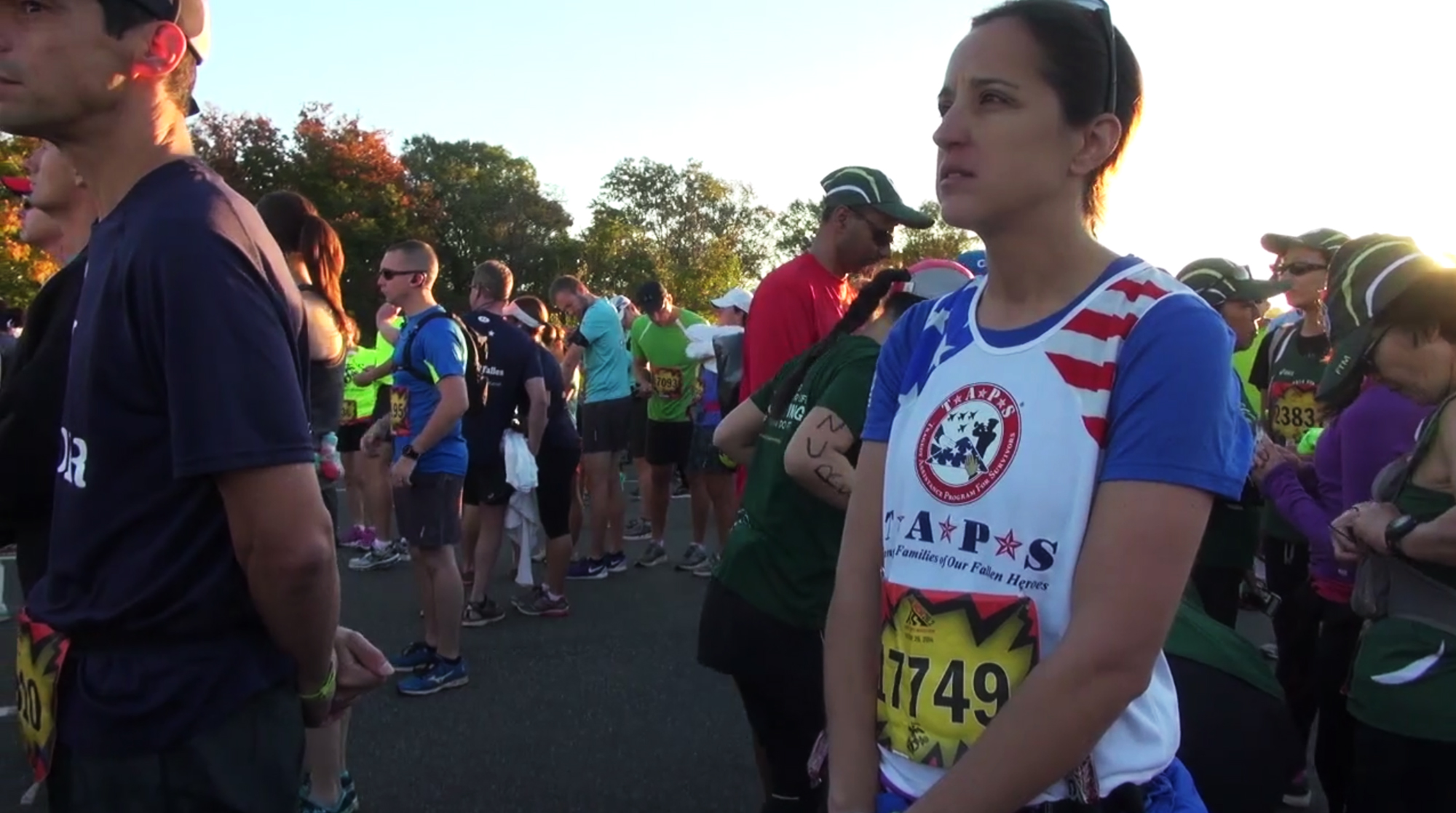WASHINGTON — Katie Groves and her husband shared a wonderful life near Savannah, Georgia. Whether painting their home or raising their two boys, they were a team who tackled everything together. They even ran together, enjoying the adrenaline as their hearts pumped and their legs grew sore.
But on March 16, 2013, everything changed.
Chief Warrant Officer 3 James Groves III, an Army helicopter pilot, was killed when his OH-58 Kiowa crashed in Kandahar, Afghanistan. He was 37. The incident, which Army officials blamed on engine failure, left the Groves family shattered and his co-pilot, 1st Lt. John Kohl,with severe brain trauma.
Katie, a former Army logistics specialist, arrived in Washington, D.C., late last week wearing one of James’ sweatshirts and the same sneakers that would carry her through all 26.2 miles of this year’s Marine Corps Marathon — the last race her husband ran before his tragic death last year. The faded black sweatshirt, sized for his hulking 6-foot 3-inch, 220-pound frame, bore the emblem of his last unit, 3rd Squadron, 17th Cavalry Regiment.
“It’s my way,” she said, “of keeping him close to me.”
Katie, 37, was one of 30,000 people who ran the marathon Sunday, finishing in under five hours despite suffering leg cramps that forced her to walk a few miles. But she wasn’t there for a good time, or for the camaraderie or fun. She just wanted to feel James’ presence again.
Linked by tragedy
Kohl, the injured co-pilot, has recovered better than anyone expected, but he will never be 100 percent, said his wife, Aileen. Katie reached out to Aileen by email shortly after the accident, as military investigators pieced together what happened and whether anyone was at fault. Her message was straightforward and kind, Aileen recalled: I hope you don’t hold nothing against me, and know that I don’t hold nothing against you.
“We didn’t want to have it be anyone’s fault,” Aileen said, adding that her own sense of survivor’s guilt made it difficult to reply to Katie. And there were so many unanswerable questions. Why did this happen to James and not John? Was it fate, or was there deeper meaning? “I just didn’t know how to have that conversation.”
But their link to the accident, Aileen said, helped the two women develop a friendship. “We were going through similar grief,” she said. And when her husband John realized what had happened, the revelation fueled his recovery.
Katie continued to visit John in rehab after the accident, which “tied us together,” Aileen said. “Yes, we’re experiencing different things and going through different things, but we share this one thing in common with this accident.”
Moving on, but constant reminders
Katie still carries several tokens of her life with James. The iPhone 4S he’d given her for Christmas. A pair of tattoos, one bearing James’ pilot ID number and the last message he sent to her: “Love u and miss u more.” She got it two weeks after he died — “when I was still numb and couldn’t feel anything,” she said.
Slowly, though, Katie is figuring out what to do with James’ belongings. For instance, she no longer wears her wedding ring because “it just didn’t feel right anymore,” she said. And now she’s searching for what’s next. A sky dive, another marathon, an ultra endurance race, a new career, a new degree. A tug toward the military — a pull away. Katie misses the camaraderie she found in the Army, but when she found herself on her own again, dynamics changed.
Last week she went to see the five-month-old service dog, a Labrador retriever named after her husband, at Walter Reed National Military Medical Center in Maryland. Debi Isenstein, the dog’s “mother” at the medical center, looked up photos of James. Dark skin, brown eyes, mustached and short-cropped hair. “Handsome, handsome man,” she said.
“It’s the mischievousness in his eyes,” Katie responded.
After the marathon Katie sat on the grass in Arlington National Cemetery. James’ grave isn’t far from the Marine Corps War Memorial, the race’s finish line.
She visits on their anniversary, the anniversary of his death, and whenever she can. She stays for hours when she doesn’t bring the boys, now ages 10 and 13, and said she has considered moving to D.C. from Georgia to be closer to him.
Katie placed her marathon medal around James’ headstone. It was a warm October day in the nation’s capital, but for her winter would be here all too soon. Come January, she explained, Katie will have lived longer than her husband.
Tears welled beneath her sunglasses.
The wind picked up, and Katie pulled on a bright pink sweatshirt. Her body ached, and her emotions were raw. “Everything hurts,” she said.


